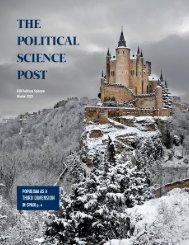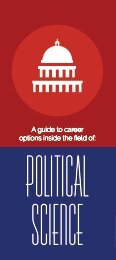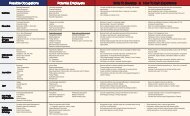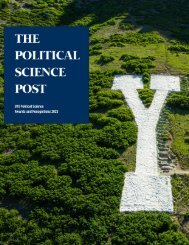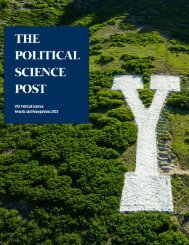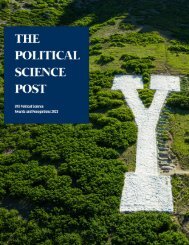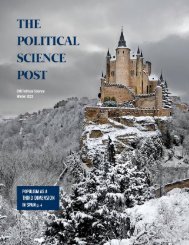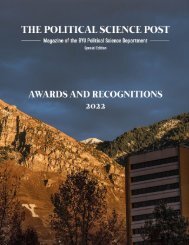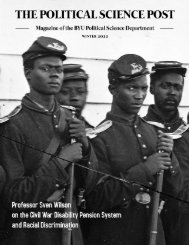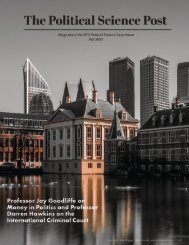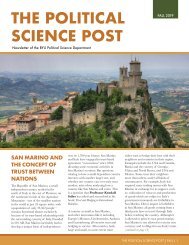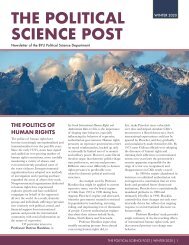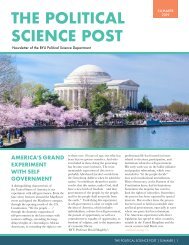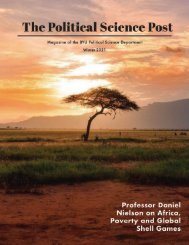Fall 2022 PSP
Fall 2022 featuring Professors Jeremy Pope and Michael Barber on the influence of the U.S. Declaration of Independence on State Constitutions
Fall 2022 featuring Professors Jeremy Pope and Michael Barber on the influence of the U.S. Declaration of Independence on State Constitutions
Create successful ePaper yourself
Turn your PDF publications into a flip-book with our unique Google optimized e-Paper software.
TABLE OF CONTENTS<br />
FOREWORD 2<br />
A REVOLUTION OF RIGHTS<br />
IN AMERICAN FOUNDING<br />
DOCUMENTS 4<br />
EVENTS AND PROGRAMS 7<br />
POLITICAL PHILOSOPHER 13<br />
ALUMNI SPOTLIGHTS 15<br />
STUDENT SPOTLIGHTS 17<br />
FACULTY SPOTLIGHTS 19<br />
FACULTY PUBLICATIONS 23<br />
FACULTY AWARDS, GRANTS,<br />
& RECOGNITIONS 25<br />
IN REMEMBERANCE 28<br />
CONCLUSION 29<br />
Publisher:<br />
Jay Goodliffe, Chair<br />
Editor:<br />
J. Matthew Clarke<br />
Assistant Editor:<br />
Krista Mortensen<br />
The BYU Department of Political Science, consistent with the aims of<br />
a BYU education, intends to foster “Lifelong Learning and Service.”<br />
We hope to provide our alumni with intelligent, thoughtful and<br />
sophisticated analysis of important issues, and to act as a catalyst for<br />
service in our communities, neighborhoods, nations and the world.<br />
1<br />
Graphic Designers:<br />
Abby Meyers,<br />
Seraphina Johnstun
FOREWORD<br />
In this issue, we recognize the retirement of Professor Eric Hyer after<br />
thirty years with BYU Political Science and the death of Professor Stan Taylor,<br />
one of our beloved professors emeritus. We also highlight the scholarship of<br />
Professors Jeremy Pope and Michael Barber, who are experts on the history<br />
of U.S. constitutions, both state and federal. They write about the dynamic<br />
relationship between the evolving state constitutions just before and after the<br />
writing of the Declaration of Independence in July of 1776.<br />
America is unique in world history in that the original 13 colonies, containing<br />
2.5 million citizens by 1776, almost universally acknowledged the importance<br />
of government restraints in favor of citizen rights. Therefore, the state<br />
constitutions and the Declaration of Independence coincided in beliefs long<br />
before the actual Constitution of the United States of America was written. It’s<br />
a fascinating look at how our colonial Americans pioneered the enforcement of<br />
citizens’ rights that are still promoted in Democracies around the world today.<br />
Independence Hall in 1776 by Thompson Westcott<br />
2
3
A Revolution<br />
of Rights<br />
in American Founding Documents<br />
Jeremy C. Pope, Michael J. Barber, Scott F. Abramson<br />
The graduation of constitutions from simple organizational<br />
documents to repositories for political rights is rooted in Anglo-<br />
American tradition—specifically, in the American colonies. The<br />
colonists of the 1760s and 1770s were captivated by discussions of<br />
political rights. They saw a constitution as an opportunity to establish<br />
political freedoms and laws.<br />
Many point to the American Founding–the series of political and<br />
military events that culminated in the 1788 U.S. Constitution–as the<br />
documentary origin of government constraints in favor of citizen<br />
rights. However, viewing American state constitutions as a long series<br />
of documents that evolved over time before the Federal Constitution<br />
is more accurate. This paper by Pope, Barber and Abramson charts<br />
that evolution, asking if there was a clear shift in the fundamental<br />
legal documents of the American colonies, and if so, when did it<br />
occur, and what was its substance?<br />
This is how the article “A Revolution of Rights in American Founding<br />
Documents,” by Scott F. Abramson, Michael J. Barber and Jeremy C.<br />
Pope, begins.<br />
The study shows a substantive, nearly universal, break that clearly<br />
exists in conjunction with the Declaration of Independence in 1776,<br />
not the U.S. Constitution in 1788. The first Constitution of the State<br />
of New Hampshire, adopted on January 5, 1776, was the first written<br />
constitution for an independent state in the New World and set<br />
the stage for the Declaration of Independence in July of that same<br />
year. Virginia passed its own state constitution on June 29th, 1776,<br />
4
followed by New Jersey on July 2nd, Delaware<br />
on September 21st, Pennsylvania on September<br />
28th, Maryland on November 11th, and North<br />
Carolina on December 18th. Georgia followed<br />
suit on February 5th, 1777, followed by New<br />
York on April 20th, 1777.<br />
The results demonstrate a shift in fundamental law<br />
that came concurrent with the American Revolution<br />
and the Declaration of Independence and seems<br />
closely tied to the rights provisions introduced into<br />
the new American State Constitutions in the mid<br />
1770s.<br />
5<br />
The American colonial constitutions and state<br />
constitutions in the new emerging nation were<br />
a strong influence on the governing principles<br />
and laws of the U.S. Constitution. Drafted<br />
from 1776 to 1783, the state constitutions were<br />
themselves shaped by the colonial constitutions<br />
that preceded them, often as a reaction against<br />
the colonial charters issued by the British<br />
government. While the Constitution is a<br />
practical legal document, it is based on longheld<br />
moral, philosophical, and political beliefs<br />
and customs recognized and practiced by the<br />
pre-Revolution American people.<br />
Early American fundamental laws following<br />
the Revolutionary War are best described<br />
by a single latent dimension: the protection<br />
and enumeration of citizen rights. And the<br />
state constitutions written at the time of the<br />
Declaration of Independence clearly show two<br />
key ideas: a broad suspicion of government<br />
power, and trying to find ways to curtail its<br />
potential abuse. Changes in those early legal<br />
documents reflect something claimed by the<br />
revolutionaries themselves, that individual<br />
rights were critical to the new governments,<br />
both locally and nationally. Other factors such<br />
as culture, geography or constitutional clauses<br />
on other branches do not appear to be nearly<br />
as important. An analysis of change shows a<br />
dramatic, rapid shift in documents at the time<br />
of the revolution, again not necessarily with the<br />
drafting of the U.S. Constitution in 1787.<br />
This shift is of incredible importance because it<br />
was the moment that vague, non-written aspirations<br />
were turned into written protections of the people’s<br />
rights—a pattern that would play out over the next<br />
few centuries as future constitutions followed this<br />
precedent of written constitutions as repositories<br />
of rights. The colonial charters that preceded state<br />
constitutions had largely been drafted in London and<br />
served to create a minimal government for colonies<br />
that would serve the trade interests of the Empire.<br />
Charters were<br />
different in scope<br />
and aspiration than<br />
the constitutions that<br />
came later.<br />
The state<br />
constitutions, unlike<br />
the charters that<br />
preceded them,<br />
were promulgated<br />
by the colonial<br />
subjects alone.<br />
On May 10, 1776,<br />
with armies already<br />
on the field, the<br />
This was the<br />
moment<br />
that vague<br />
aspirations<br />
were turned<br />
into written<br />
protections<br />
of the<br />
people’s<br />
rights.<br />
Continental Congress passed a resolution to the<br />
states and their respective assemblies. Within it, they<br />
recommended adopting governments that would best<br />
conduce the happiness and safety of both the states’<br />
constituents and their new nation. This step preceded<br />
the Declaration of Independence and was the primary<br />
catalyst leading to the creation of new governments
for the former colonies. The transition from British<br />
to American authority represents a fundamental<br />
change in the nature of the foundational laws<br />
governing the American people, emphasizing<br />
the need to defend one’s right to life, liberty and<br />
property.<br />
The amelioration of written constitutions from<br />
procedural documents to political statements did<br />
not, as we’ve previously hypothesized, originate<br />
with the national Constitution, the Bill of Rights,<br />
or the Philadelphia constitutional convention.<br />
Rather, it was the state constitutions created in<br />
1776 and after, at the beginning of the revolution,<br />
that established this revolutionary constitutional<br />
precedent.<br />
colonists no longer trusted the government of the<br />
British Empire to respect their rights as Englishmen,<br />
they not only declared their independence, but drafted<br />
new constitutions that emphasized and guaranteed<br />
their individual rights.<br />
Using an original dataset of institutional features<br />
of 43 colonial charters and constitutions, and a<br />
combination of IRT and text based methods, Pope,<br />
Barber and Abramson develop a series of systematic<br />
statistical tests to show these findings.<br />
The revolutionary change in the substance of<br />
American constitutions first occurred at the local<br />
level, from the ground up. Early colonial America<br />
had a high level of local knowledge related to<br />
the importance of citizen rights. Once the local<br />
“A Revolution of Rights in American Founding Documents” was published in the Journal of Political Institutions and<br />
Political Economy: Vol. 3: No. 2, pp 124-147, 28 Jun <strong>2022</strong>. © <strong>2022</strong> S. F. Abramson, M. J. Barber and J. C. Pope<br />
6
EVENTS &<br />
PROGRAMS<br />
Durham Lecture <strong>2022</strong><br />
Gail Miller, CEO of the LHM Company, spoke for the <strong>2022</strong> Durham Lecture about “The Courage to be You.”<br />
Her remarks admonished students, faculty, staff, and visitors to have the courage to live the life that you were<br />
meant to live. We cannot sit and expect life to come to us, she exclaimed. It takes courage to decide who you are<br />
and what your fundamental principles will be, but those decisions–especially made early, as she advised–will<br />
guide you along the path you’re meant to follow.<br />
From her childhood experiences of growing up in the poor Marmeland District<br />
of Salt Lake City with eight siblings, Gail attested to the importance of hard<br />
work, saving money, and taking reasonable risks to advance your career. She<br />
and her husband Larry Miller, who passed away in 2009, made their fortune<br />
from scratch with the help of those precepts.<br />
Thank you, Gail, for memorable remarks.<br />
The annual Durham Lecture occurred on Thursday, February 10, 11:00 AM, at the Hinckley Center<br />
Assembly Hall.<br />
Speed Mentoring at the Utah State Capitol <strong>2022</strong><br />
BYU Political Affairs Society<br />
Around 50 students participated in the BYU Political Affairs Society’s Utah State Capitol visit on Friday,<br />
February 25, <strong>2022</strong>. In a tour conducted by Professor Adam Dynes, everyone attending observed the Utah House<br />
of Representatives and Utah State Senate in session, as well as the Committee Rooms and Governor’s offices.<br />
A job networking event also took place with Utah Officials and Politicos, wherein 15 Utah executives met at<br />
intervals with the BYU students, answered questions, and delivered advice.<br />
It was a wonderful event and the BYU Political Affairs Society, Professor Adam Dynes and Professor Liz<br />
McGuire helped our students gain new experience in politics. Thank you to all who attended and helped, and<br />
especially to Mike Mower, the President of the Salt Lake City Chapter of the BYU Political Affairs Society.<br />
Sincere appreciation to everyone!<br />
7
8
Beyond BYU, Washington D.C. <strong>2022</strong><br />
BYU Political Affairs Society<br />
Beyond BYU <strong>2022</strong> took place on May 5 and 6, <strong>2022</strong> in Washington, DC after two virtual years during the<br />
Pandemic. Students and alumni were eager to meet again in this networking event that took place mostly on<br />
Capitol Hill, but also at offices and professional venues all over DC, Maryland and Virginia. Approximately 150<br />
students and professionals participated in the main keynote event with Judge Thomas Griffith, in the Russell<br />
Kennedy Caucus Room, with 100 professional office visits in the morning, and 100 in the afternoon of Friday<br />
May 6. We sincerely thank our alumni for giving their time to help our students. Some students also were able<br />
to attend the Washington, DC Temple Open House on the morning of May 5.<br />
Beyond BYU is a networking event in Washington, DC. BYU students traveled in groups to meet at the<br />
offices of various DC PAS Chapter members who work for businesses, Congress, government entities, trade<br />
organizations, law firms, political consulting boutiques, international relations groups, and many more to<br />
learn what makes D.C. tick. The BYU Political Affairs Society (PAS) DC Chapter hosted the Beyond BYU<br />
<strong>2022</strong> “mentoring” and networking event! This was the 13th annual event. Also, new this year, the BYU<br />
Sorensen Center for Moral and Ethical Leadership hosted networking events in DC on Saturday, May 7, which<br />
complemented the events held for Beyond BYU.<br />
9<br />
Judge Thomas Griffith addressing BYU students in the Kennedy Caucus room on Capitol Hill.
LDS Scholars Workshop <strong>2022</strong><br />
BYU Department of Political Science<br />
On May 19th and 20th, <strong>2022</strong>, after a 5-year hiatus, the BYU Political Science Department hosted its third LDS<br />
Scholars Workshop on BYU-Provo campus. Led by Professor Ryan Davis, the motivation behind the workshop<br />
is to provide a venue for young LDS scholars to foster professional networks with other LDS scholars (junior<br />
and senior), as well as receive feedback on their work. Mentors from amongst the BYU faculty helped graduate<br />
students and newly-minted assistant professors prepare for the conference: they proof-read their pupils’ papers,<br />
advised them on how to give good discussant feedback, and gave them tips on presentation techniques.<br />
The network of LDS political scientists is steadily growing in the U.S. Our department maintains a list of<br />
former BYU students who went on to PhD programs, as well as non-BYU folk in the discipline. The list is<br />
almost 150 names long and includes LDS political scientists in PhD programs at top universities such as<br />
Harvard, Princeton, Yale, and Michigan, as well as professors at a variety of institutions around the country and<br />
the world.<br />
This year, we invited 30 participants to present their work over a two-day workshop. BYU faculty provided<br />
feedback, and each session involved lively discussion amongst the participants. LDS political scientists across<br />
the country are engaged in cutting-edge research on important topics, including: the Quality of Democracy<br />
around the world, as evidenced by vote buying, money politics, and gerrymandering, political disagreements<br />
hampering legislation, the rule of law, interest groups, and political ads. Also of importance, Domestic U.S.<br />
Politics and Foreign Relations; World Political Development (ex: elections in Russia); and Gender in Politics.<br />
10
Ukraine Nuclear Crisis Simulation <strong>2022</strong><br />
Nuclear Strategy and American Diplomacy<br />
Prof. Kerry Kartchner’s Spring <strong>2022</strong> Poli 470 class (Nuclear Strategy and American Diplomacy) held a<br />
“Ukraine Nuclear Crisis Simulation” at the Kennedy Center on May 18, 2002. 30 students and faculty<br />
participated in a multilateral role-playing simulation involving hypothetical Russian use of nuclear weapons<br />
in Ukraine. Participants were divided between teams representing the US National Security Council, NATO’s<br />
Nuclear Planning Group, and Ukraine’s State Security Council.<br />
In addition to students enrolled in the class, participants included students from the Political Science<br />
Department at BYU, the Center for Anticipatory Intelligence at Utah State University, and staff from the Center<br />
for National Security Studies at Utah Valley University. Dr. Kartchner also took his class up to the Hill Air<br />
Force Base Museum on Friday, June 3, to see the planes associated with nuclear armament in the U.S.<br />
11
<strong>2022</strong> ACUNS Conference<br />
Evidence-Based Solutions for Intensifying Global Challenges<br />
From left: J. Matthew Clarke, JD; Professor Alynna Lyon; Professor Ken Stiles at the ACUNS Conference.<br />
Geneva, Switzerland | Thursday-Saturday, 23-25 June <strong>2022</strong><br />
The Annual Conference for ACUNS was attended by Professor Ken Stiles, who is co-Editor in Chief of the<br />
Global Governance Journal for ACUNS. Managing Editor Matthew Clarke, from BYU Political Science, also<br />
attended. BYU Political Science hosts the Global Governance Journal until July 2024.<br />
The <strong>2022</strong> ACUNS Annual Meeting, which took place on 23-25 June, led up to UN Charter Day on 26 June.<br />
It was co-organised and -hosted by the Graduate Institute of International and Development Studies and UN<br />
Geneva to inspire the participation of UN staff and delegates in Geneva and beyond. The conference supports<br />
ACUNS’s core mission of bringing together scholars and practitioners active in the work of the UN to better<br />
understand and address major global problems.<br />
The <strong>2022</strong> Annual Meeting created the space for researchers, UN staff and delegates to:<br />
• Present and discuss their latest academic and policy research<br />
• Showcase constructive and innovative research-policy collaborations<br />
• Demonstrate digital tools and mechanisms that facilitate research uptake<br />
• Strengthen research-policy collaborations and networks<br />
Lise Grande gave the Holmes Lecture <strong>2022</strong> at the ACUNS Annual<br />
Conference. Grande is the president and CEO of the U.S. Institute of Peace,<br />
an independent, nonpartisan, federally funded institute charged with the<br />
mission to prevent, mitigate, and resolve violent conflict around the world.<br />
She has 25 years of continuous overseas experience leading, managing, and<br />
coordinating complex operations for the United Nations.<br />
Grande has held leadership positions in humanitarian, stabilization,<br />
peacekeeping, peacebuilding, and development operations in Africa, the<br />
Middle East, Asia, and the Caucasus.<br />
12
POLITICAL<br />
PHILOSOPHER<br />
13
Jean-Jacques<br />
Rousseau<br />
Jean-Jacques Rousseau (28 June 1712 –<br />
2 July 1778) was a Genevan philosopher, writer, and<br />
composer. His political philosophy influenced the<br />
progress of the Enlightenment throughout<br />
Europe, as well as aspects of the French<br />
Revolution and the development of modern<br />
political, economic, and educational thought.<br />
Rousseau’s sentimental novel Julie, or the New<br />
Heloise (1761), was important to the development<br />
of pre romanticism and romanticism in fiction.<br />
His Emile, or Treatise On Education (1762), is an<br />
educational treatise on the place of the individual in<br />
society. Rousseau’s autobiographical writings—the<br />
posthumously published Confessions (composed in<br />
1769), which initiated the modern autobiography,<br />
and the unfinished Reveries of the Solitary Walker<br />
(composed 1776–1778)—exemplified the late<br />
18th-century “Age of Sensibility,” and featured an<br />
increased focus on subjectivity and introspection that<br />
later characterized modern writing. His Discourse on<br />
Inequality and The Social Contract are cornerstones<br />
in modern political and social thought.<br />
Rousseau befriended fellow philosopher Denis<br />
Diderot in 1742, and would later write about<br />
Diderot’s romantic troubles in his Confessions.<br />
During the period of the French Revolution,<br />
Rousseau was the most popular of the philosophers<br />
among members of the Jacobin Club. He was interred<br />
as a national hero in the Panthéon in Paris, in 1794,<br />
16 years after his death.<br />
Rousseau was an advocate of equality within society.<br />
He, along with fellow philosopher Voltaire (real<br />
name Francois-Marie Arouet) gave the American<br />
Revolution and our founding fathers important<br />
concepts upon which to build a new form of<br />
government. This, in turn, contributed to the zeitgeist<br />
that enabled the French Revolution.<br />
“To live is not to breathe but to act. It is to make use of our<br />
organs, our senses, our faculties, of all the parts of ourselves<br />
which give us the sentiment of our existence. The man who<br />
has lived the most is not he who has counted the most years<br />
but he who has most felt life.”<br />
Jean-Jacques Rousseau, Emile, or Treatise On Education<br />
14
ALUMNI<br />
SPOTLIGHTS<br />
Kevin J. Worthen<br />
President of Brigham Young University<br />
Kevin Worthen is a BYU Political Science major graduate who also went to the J. Reuben Clark Law School.<br />
He became Dean of the J. Reuben Clark Law School, and later President of BYU.<br />
The youngest of four children, Worthen is a native of Carbon County, Utah born in Dragerton, Utah and raised<br />
in Price, Utah. He served as an LDS missionary in Monterrey, Mexico. Worthen earned an associate degree<br />
from the College of Eastern Utah (CEU), where he was co-captain of the varsity basketball team and graduated<br />
co-valedictorian in 1978. While at CEU, Worthen worked summers as a coal miner. He graduated summa cum<br />
laude with a bachelor’s degree in political science from BYU in 1979.<br />
In 1982, Worthen graduated summa cum laude from BYU’s JRCL at the top of his class. He earned the<br />
distinction of Order of the Coif. Following graduation, he clerked for Judge Malcolm Wilkey of the United<br />
States Court of Appeals for the D.C. Circuit, and for Justice Byron White of the United States Supreme Court.<br />
He practiced law in Phoenix, Arizona from 1984 to 1987 with the law firm of Jennings, Strouss & Salmon.<br />
While practicing law in Arizona, Worthen found that he was very interested in the history of laws, leading him<br />
to consider teaching law.<br />
On March 11, 2014, Henry B. Eyring, First Vice Chairman of the BYU Board of Trustees, announced that<br />
effective May 1, 2014, Worthen would succeed Cecil O. Samuelson as the president of BYU. Worthen was<br />
officially inaugurated as BYU’s 13th president September 9, 2014, in a special devotional assembly.<br />
15
Meghan Beatty Einfeldt<br />
Meghan was a BYU Poli Sci Major who graduated in 2019, and she has been<br />
living in Syracuse, New York, with her husband, where she received her<br />
Master of Public Administration from Syracuse University. They recently<br />
moved to Arkansas, where her husband is studying for his MFA degree in<br />
Creative Writing at the University of Arkansas.<br />
She grew up in St. George, Utah, and served a mission in Peru, after which<br />
she worked at the U.S. Embassy in Lima. She has been working in local<br />
government in New York and Arkansas, most recently working as an<br />
administrative analyst for the Arkansas Department of Human Services.<br />
In the future, Meghan plans to build her career in research and analytics,<br />
and eventually go on to earn a PhD in Latin American Studies. She and her<br />
husband are currently expecting their first child, and are excited to add to their<br />
family as they each pursue their higher education degrees and career goals.<br />
Andrew, Senior Project Manager at Target Point Consulting, grew up<br />
in North Ogden, Utah and studied Political Science at BYU, where he<br />
gained experience in polling and data collection as a research assistant.<br />
He used his experience to become an executive at Target Point Consulting<br />
in Washington, DC and uses that experience in survey methodology and<br />
design to help produce important insights for Target Point’s clients. He also<br />
manages the intern program and enjoys coming up with creative ways to<br />
teach others about market research.<br />
Andrew Meeks<br />
Prior to working at Target Point, Andrew researched voting behavior at the<br />
local level and the effects “convenience voter laws” have on voter turnout.<br />
He was also involved in creating and analyzing political surveys while<br />
studying survey methodology during his undergraduate education at BYU.<br />
Andrew is proficient in Mandarin Chinese. He enjoys listening to audio<br />
books, traveling, watching TV shows with his wife, playing the piano, and<br />
finding the best burger joints everywhere he goes.<br />
16
STUDENT<br />
SPOTLIGHTS<br />
Haeley Christensen<br />
Editor in Chief, BYU Political Review<br />
Haeley is a sophomore from Gilbert, Arizona. She is studying<br />
English and minoring in Political Science here at BYU.<br />
Haeley is a senior and Editor-in-Chief of the Political Review.<br />
Although writing is her greatest passion, Haeley’s interest<br />
in politics was stirred at a young age with compulsory NPR<br />
sessions in the car and pretend presidential elections in<br />
elementary school. She also attributes a lot of her political<br />
involvement to her mother, who was always pulling her<br />
into some crusade for local government or school boards in<br />
her home state of Arizona. Haeley has distinct memories of<br />
licking stamps for envelopes stuffed with information about<br />
the latest bills and marching in rallies at the state capitol.<br />
Now she channels her political interests (and need to correct<br />
comma usage) into the review each month. She wrote for<br />
a year before becoming publisher and is now thrilled to be<br />
working as the editor. Her favorite topics to explore include<br />
South Korean politics, public education, and realities of the<br />
American Dream.<br />
Aside from writing and studying<br />
constantly, she’s a fan of musical theater,<br />
Wikipedia rabbit holes, and combing<br />
through every rack at thrift stores. Haeley<br />
hopes to work in an industry involving<br />
writing or journalism before applying<br />
for grad school. If she pursues that path,<br />
earning a PhD would be the ultimate<br />
goal—<br />
probably in English, hopefully with an<br />
emphasis on Asian American studies.<br />
17
Marissa Gerber Pinnock<br />
Editor in Chief, SIGMA<br />
Marissa serves as the Editor in Chief for Sigma: Journal of Political<br />
and International Studies. Marissa is a senior studying Economics<br />
with a minor in Business. She has been involved in Sigma for the past<br />
three years, first as a copy editor and then, last year, as the managing<br />
editor. She is passionate about helping students publish their research<br />
and talking about the world. Marissa served a LDS mission in the<br />
Philippines from 2018 to 2020 and dreams of starting a nonprofit<br />
organization focused on improving educational opportunities for<br />
Filipinos. After graduation, Marissa will begin work at Deloitte in their<br />
advisory practice as a cyber risk analyst. In her free time, she loves to<br />
swing dance, watch BYU football, and cook.<br />
Amelia Watterson<br />
Lead Editor, SIGMA<br />
Amelia Watterson serves as the Lead Editor for Sigma: Journal<br />
of Political and International Studies. She is a junior majoring in<br />
International Relations and minoring in International Development.<br />
She was born in Calgary, Alberta and raised in Denver, Colorado.<br />
From 2020 to 2021, she served a mission for the Church of Jesus<br />
Christ of Latter-day Saints in São Paulo, Brazil and Pittsburgh,<br />
Pennsylvania. She recently completed an internship with the annual<br />
International Religious Freedom Summit in Washington, DC, and<br />
hopes to one day work in the field of international law or international<br />
human rights advocacy.<br />
Elle Diether<br />
Managing Editor, SIGMA<br />
Elle Diether serves as the Managing Editor for Sigma: Journal of<br />
Political and International Studies. Elle is currently a senior studying<br />
Political Science with a minor in Mathematics. She has been<br />
previously involved in BYU Political Review and is currently working<br />
as a research assistant for Professor Pope and Professor Monson. She<br />
hopes to attend graduate school in Political Science and become a<br />
professor. Her interests include political conversations, electoral rules,<br />
and hegemonic transitions. During her free time, she enjoys touring<br />
Civil War battlefields, playing video games, and lip synching to<br />
Broadway soundtracks.<br />
18
19<br />
PIC OF CAMPUS ON THIS PAGE
FACULTY SPOTLIGHTS<br />
Professor<br />
Jeremy Pope<br />
Professor<br />
Michael Jay<br />
Barber<br />
Professor Pope studied Economics at BYU before<br />
receiving both an MA and PhD in Political Science<br />
at Stanford University. He grew up in Provo, Utah<br />
as the son of economics professor Clayne L. Pope.<br />
Jeremy studied Economics and Political Science as an<br />
undergrad at BYU and loved the tools of economics,<br />
though not the questions. After graduating BYU,<br />
Jeremy worked in Washington, D.C. at the American<br />
Enterprise Institute, a conservative center-right think<br />
tank centered around policy. He has taught and lectured<br />
at Stanford and lectured at William and Mary. He<br />
served a mission in the Bay Area, and learned Laotian<br />
and Thai serving refugees there.<br />
His favorite historical place in the U.S. is Independence<br />
Hall in Philadelphia, where the Declaration of<br />
Independence was signed. When he is in Independence<br />
Hall, Jeremy feels a palpable sense of history and scale.<br />
The Hall is small by modern standards, but momentous<br />
events occurred there. Thomas Jefferson, at just 33<br />
years of age, wrote the vast majority of the Declaration<br />
in a small boarding house room in Philadelphia, not far<br />
from Independence Hall.<br />
Since 2014, Jeremy has been the co-director of the<br />
Center for the Study of Elections and Democracy<br />
(CSED) at BYU, along with Professor Chris Karpowitz.<br />
In December 2020, he published his book: Founding<br />
Factions: How Majorities Shifted and Aligned to Shape<br />
the U.S. Constitution (with Shawn Treier). He also<br />
works on political polarization, campaign finance,<br />
caucuses, political ideology, and race in voting. Much<br />
of his recent scholarly work is about the Founding<br />
Fathers.<br />
Professor Barber is an associate professor of<br />
political science at Brigham Young University in<br />
Provo, Utah, and a faculty scholar at the Center for<br />
the study of Elections and Democracy (CSED). His<br />
research focuses on the causes and consequences<br />
of ideological polarization in American politics<br />
- among both elected officials and the public.<br />
He received his PhD in politics from Princeton<br />
University in 2014, after graduating in Poli Sci<br />
from BYU in 2008, and has published research in<br />
a variety of edited volumes and scholarly journals<br />
such as Science Advances, American Political<br />
Science Review, American Journal of Political<br />
Science, Journal of Politics, Political Analysis,<br />
Public Opinion Quarterly, and others.<br />
Mike grew up in Spokane, WA. He enjoyed living<br />
in New Jersey during graduate school, especially<br />
since key events in the Revolutionary War, including<br />
the Battle of Princeton, occurred there. One of<br />
the stories he heard as a student was that when<br />
the British took over Nassau Hall on Princeton<br />
campus, George Washington marched onto campus<br />
and launched an attack that drove the British from<br />
their garrison in Nassau Hall. The decisive victory<br />
left enduring marks: one cannonball gouge from<br />
Washington’s artillery is still visible on the south<br />
wall of Nassau.<br />
Mike enjoys living in Utah, and met his wife Karen<br />
here at BYU after his graduate work. She is a<br />
professor of Chemistry at BYU. They now have two<br />
children, ages 4 and 2. He loves working with BYU<br />
Political Science.<br />
20
Professor Eric Hyer<br />
Retires<br />
Professor Eric Hyer came to BYU in January of 1988, after completing his PhD at Columbia University in<br />
New York City. From 1990-1995, Hyer was the coordinator for what was then called International Studies,<br />
now International Relations. He moved to China for a year, and when he returned, BYU elected him as the<br />
director of graduate studies. He directed the grad program from ‘96 to ‘99.<br />
While growing up, Hyer was surrounded by the Asia Pacific region. His father was a BYU professor in the<br />
history department; he taught Asian History (Far Eastern History), and studied China and Mongolia. As a<br />
child, Hyer’s family lived in Japan and Taiwan while his father conducted research there. Naturally, Hyer<br />
developed an interest in China from his experiences.<br />
Professor Hyer’s career has seen U.S-China relations come full circle. While he was studying Chinese<br />
in Taiwan in 1972, President Nixon visited China, a monumental event in U.S-China relations. When he<br />
started graduate school in 1979, China had opened to reform policies under Deng Xiaoping, and China<br />
embraced free enterprise and ended strict Marxist communism. American-China student exchanges began,<br />
and Professor Hyer went to China in 1980 to continue studying Chinese and broaden his knowledge of<br />
Chinese culture and politics. At the time there was optimism that China would become the eastern flank<br />
of NATO in opposing the Soviet Union, which had just invaded Afghanistan. However, on June 4, 1989,<br />
the Tiananmen Square Massacre occurred, indicating that China and Deng Xiaoping had not embraced as<br />
much of western liberalism as originally hoped.<br />
Professor Hyer has seen this complete<br />
cycle during his career studying<br />
China, from the opening up of<br />
US-China relations in 1972, to the<br />
liberalizing of China, and now back<br />
to competition and strategic concern<br />
in <strong>2022</strong>. As Professor Hyer reflects<br />
on his career at BYU, and on his<br />
experiences in the Indo-Pacific region,<br />
and specifically on China, he has a<br />
few thoughts about the presence and<br />
future actions of China, as well as<br />
BYU’s positive impact on foreign<br />
relations.<br />
(continued on pg. 23)<br />
21<br />
Eric and his grandson at the Great Wall of China.
22
US-China Relations: China is a challenge economically and militarily. China clearly wants to surpass the<br />
USA as the strongest economy and leader of the world. China is a leader in AI, but also on the dark side of<br />
AI, using information against people in a new digital authoritarianism. The USA needs to up its game in<br />
order to stay ahead.<br />
China in the Indo-Pacific region: China claims some islands in the South China Sea, but Malaysia, the<br />
Philippines and Vietnam also control islands. The South China Sea is a major sea lane for the entire world, so<br />
all countries will maintain a presence there to ensure China does not monopolize the area.<br />
BYU stands out: we are the top university in the nation for preparing students to get PhDs in foreign<br />
language and literature (1). We send many students to work in the Foreign Service and the CIA. That’s very<br />
impressive to the US government, specifically the Department of Education. The DOE oversees the National<br />
Resource Center grant Professor Hyer has administered since 2010, which offers students foreign language<br />
and area studies scholarships and supports faculty research, curriculum development and outreach to the<br />
larger community. BYU has also built an excellent Asian Studies program.<br />
Professor Hyer loved his many years at BYU. Now, he’s at a point in his life where he is stepping away from<br />
teaching and administration in pursuit of other passions, mainly a research project and a book that he needs<br />
to somehow get on paper. Thank you, Professor Eric Hyer, for a wonderful career at BYU Political Science<br />
and at the Kennedy Center.<br />
References: 1. https://news.byu.edu/byu-no-1-in-the-nation-for-launching-business-foreign-language-ph-d-s<br />
23
FACULTY IN THE NEWS<br />
Professor Joel Selway<br />
in the Washington Post<br />
Professor Selway has written an article for the Washington Post Monkey Page<br />
entitled: “Has time run out for Thailand’s prime minister?” The article notes<br />
that the Constitutional Court of Thailand, the highest court in that country, has<br />
temporarily suspended Prime Minister Prayuth’s duties. Prayuth has been in<br />
power since his military coup in 2014, and helped engineer a new constitution.<br />
Its limits on presidential tenure–eight years–now complicate his political future.<br />
Professor Jessica Preece<br />
“Being a Disciple of Hope”<br />
Professor Jessica Preece wrote an article for BYU Studies in<br />
issue 61.1, on “Being a Disciple of Hope,” about barriers and<br />
prejudices in the political world, and how she maintains hope<br />
as a Political Scientist. Specifically, she writes that there are<br />
all sorts of real considerations and barriers that people face<br />
as they make decisions about political involvement. It is her<br />
position that the attitudes with which we approach politics have<br />
profound implications for ourselves and others.<br />
How do we fight against the temptation of cynicism and reclaim<br />
hope? How do we simultaneously acknowledge the limitations<br />
of our ability to effect change while also continuing to try? As<br />
someone who has had to fight this battle her whole life, she has<br />
developed two strategies. First, she tries to discipline herself<br />
to remember that she has covenanted to be a person of faith,<br />
hope, and charity. Second, she tries to remember that cynicism<br />
is a defense mechanism. It’s rooted in the reality that when you<br />
try, failure is a possible (or maybe even probable) outcome, and<br />
failure is very painful. The only antidote she has found for this<br />
is to acknowledge her fear and try to remember that God will<br />
take care of us.<br />
24
Chad E. Nelson<br />
Revolutionary Contagion and International Politics<br />
centuries, including the American Revolution, the Russian Revolution, the Italian Fascist revolution, and the<br />
Iranian Islamist Revolution. When do leaders fear that a revolution elsewhere will spread to their own polities,<br />
and what are the international effects of this fear? This book develops and tests the domestic contagion effects<br />
theory. According to the theory, fear of contagion is driven more by the characteristics of the host rather than<br />
the activities of the infecting agents. In other words, leaders will fear revolutionary contagion when they have<br />
significant revolutionary opposition movements that share the same ideological affinity of the revolution.<br />
Cases spanning the reaction to the democratic American Revolution and the Dutch Patriot Revolt, the wave<br />
of liberal revolutions in Europe in 1820-21, the<br />
Russian communist and Italian fascist revolutions,<br />
and the Iranian Islamist revolution in the Middle East<br />
largely support the theory of revolutionary contagion.<br />
Whether the revolutionary state merely serves as<br />
a model for revolution or whether it also acts as a<br />
platform, attempting to spread revolution abroad, is<br />
not the crucial distinction.<br />
Revolutionary Contagion and International Politics addresses when leaders<br />
fear revolution is spreading and how that affects international politics.<br />
It argues that leaders fear contagion only when they have a significant<br />
revolutionary movement of their own. When leaders have a fear of<br />
contagion, it will have a profound effect on international politics, prompting<br />
hostility towards the revolutionary state and cooperation with states that<br />
have similar fears, sometimes in contrast to geopolitical pressures.The book<br />
tests this theory by assessing the response by major powers to revolutions<br />
and revolts from an the major ideological movements of the last two<br />
This book advances our understanding of when,<br />
why, and how much states with different domestic<br />
ideologies affect international relations. The contest<br />
over regime types has had a profound effect on<br />
international politics in certain times and places, and<br />
the domestic contagion effects theory is a principal<br />
way that this is manifested. In certain periods in<br />
international relations, one simply cannot make sense<br />
of international politics – patterns of alliances and<br />
wars – without considering the fear of contagion.<br />
25
Professors Michael Barber and John Holbein<br />
in the Public Library of Science<br />
Academic journal PLOS published an article written by Professor Barber and former BYU Political Science<br />
Professor John Holbein (now at the University of Virginia). Their article, “400 million voting records show<br />
profound racial and geographic disparities in voter turnout in the United States,” compares representative<br />
democracy ideals with the reality of such governments.<br />
One of the core tenets of a well-functioning representative democracy is that the people who vote to elect<br />
government officials are representative of the public. However, reality is far from this lofty ideal. With a<br />
level of granularity and precision unlike any previous research efforts, Barber and Holbien documented large<br />
and persistent gaps in voter turnout by race, age, and political affiliation. Minority citizens, young people,<br />
and those who support the Democratic Party are much less likely to vote than white people, older citizens,<br />
and Republican Party supporters. Minorities, youth, and democrats are also much more likely to live in local<br />
communities where fewer individuals vote—areas that we term turnout deserts. Turnout deserts are especially<br />
harmful given that they are self-reinforcing—bolstered by the social dynamics that fundamentally shape<br />
citizens’ voting patterns.<br />
Barber and Holbein’s results show glaring inequalities in U.S. political participation. These patterns threaten<br />
the very fabric of our democracy and fundamentally shift the balance of political power towards the interests<br />
of white people, older citizens, and Republicans. They illustrate that participation in the United States is<br />
strikingly unequal—far from the ideals that this country has long aspired to.<br />
Independence Hall in Philadelphia by Ferdinand Richardt<br />
26
FACULTY AWARDS, GRANTS, & RECOGNITIONS <strong>2022</strong><br />
FHSS College Awards<br />
Chris Karpowitz<br />
Martin B. Hickman Innovation in<br />
Teaching Award<br />
Mike Barber<br />
FHSS Early Career Scholar<br />
(ongoing)<br />
Kelly Patterson<br />
Martin B. Hickman Innovation in<br />
Teaching Award<br />
Darren Hawkins<br />
J. Reuben Clark Jr. Grant<br />
Adam Dynes<br />
Mary Lou Fulton Young Faculty<br />
Award<br />
Celeste Beesley<br />
Women’s Research Initiative<br />
Grant/Outstanding Mentoring<br />
Josh Gubler<br />
BYU Early Career Teaching<br />
Award (ongoing)<br />
Krista Mortensen<br />
Outstanding Rookie Award<br />
Political Science Department Awards<br />
Darren Hawkins<br />
BYUPAS Professor of the Year<br />
Adam Brown<br />
Outstanding Teaching<br />
Ethan Busby<br />
Outstanding Scholarship<br />
Sven Wilson<br />
Outstanding Service<br />
27
TRIBUTE TO STAN TAYLOR<br />
Stan A. Taylor was born on April 11, 1934 in Provo to Melvin<br />
Taylor, an auto mechanic, and Arma Hancock Taylor, a nurse.<br />
He grew up in Provo and graduated from Provo High School. He<br />
served an LDS mission in the Chicago area and then returned to<br />
Provo, where he attended BYU and persuaded Victoria Richards<br />
from Salt Lake to marry him.<br />
After graduating from BYU with a degree in Political Science, Stan<br />
entered the Ph.D. program at the prestigious Fletcher School of<br />
Law & Diplomacy, part of Harvard University and Tufts College<br />
in Boston, MA. While in Boston, Stan served as the bishop of<br />
the Billerica Ward in his mid-20s, and as the chair of the Political<br />
Science Department at Bentley College.<br />
In 1968, after receiving his doctorate from Fletcher, Stan took a position as a professor at BYU, teaching classes<br />
for nearly four decades in political science and international relations. Stan was chair of the BYU Political<br />
Science Department for six years. He also founded the David M. Kennedy Center for International Studies,<br />
becoming its first director. He received every award BYU gives to faculty members and was beloved by his<br />
students. A scholarship fund was set up at BYU in Stan’s name to help students with their tuition and other<br />
expenses. Stan took two two-year leaves of absence from BYU to work in government in Washington, D.C. He<br />
was first a legislative assistant for Utah Congressman Gunn McKay and later a member of the US Senate Select<br />
Committee on Intelligence, appointed by Utah Senator Jake Garn. Stan became an expert in national security<br />
matters, teaching classes on the subject at BYU and in other schools around the US and the world, including in<br />
New Zealand, England and Wales. He published numerous books and articles and advised presidents and prime<br />
ministers.<br />
Stan continued to serve in The Church of Jesus Christ of Latter-day Saints in a number of capacities. He served<br />
as a special senior missionary, advising members of The Church’s First Presidency and Quorum of the Twelve<br />
Apostles on international political matters. Stan was a proficient musician and excellent trumpet player. After<br />
his first mission for The Church, he formed The Stan Taylor Dance Band to help pay for his college expenses.<br />
Later, he was a trumpet player with the Utah Valley Symphony for many years. He was also known to play the<br />
Australian didgeridoo from time to time, to the amusement of his family and friends.<br />
Stan died Saturday, January 15, <strong>2022</strong>, at the age of 87, after a long battle with Parkinson’s Disease. He is<br />
survived by his beloved wife, Victoria, and four of his five children, Paul, Dave, Julie, and John. He is also<br />
survived by 24 grandchildren and an increasing number of great-grandchildren.<br />
28
IN CONCLUSION<br />
From “Accountable Citizenship,” by Stan A. Taylor, May 5, 1998<br />
There are two conditions under which the earthly kingdom of God cannot exist comfortably. The first<br />
is under anarchy, where individuals are so concerned with physical survival that they cannot devote time and<br />
attention to more eternal concerns. The condition of anarchy and the terror of living one’s daily life under<br />
anarchy are well described in the Book of Mormon in Ether: “And now there began to be a great curse upon<br />
all the land because of the iniquity of the people, in which, if a man should lay his tool or his sword upon . . .<br />
the place whither he would keep it, behold, upon the morrow, he could not find it. . .Wherefore every man did<br />
cleave unto that which was his own, and would not borrow neither would he lend; and every man kept the hilt<br />
of his sword in his right hand, in the defense of his property and his own life and of his wives and children.”(1)<br />
The second condition is dictatorship, where all or some religious practice is banned. As Elder Bruce D. Porter<br />
has reminded us, “anarchy and dictatorship are related: As is often the case in history, absolute dictatorship was<br />
made possible not by the steady growth of government into a leviathan of power, but rather by the destruction of<br />
government, which left a vacuum into which ruthless men could move.”(2)<br />
Both anarchy and dictatorship thwart God’s plan, since both deny agency. Both anarchy and dictatorship create<br />
a society advocated and described by Korihor in the Book of Mormon: “a society in which every man fared in...<br />
life according to the management of the creature; therefore every man prospered according to his genius, and...<br />
every man conquered according to his strength; and whatsoever a man did was no crime.”(3) D&C Section<br />
134 requires us to respect government and work for the establishment of well-ordered and well-administered<br />
governments to avoid the evil consequences of anarchy and terror. Government is the opposite of anarchy. It<br />
was instituted by God to prevent that kind of society from existing. It is an exalted and ennobling principle.<br />
And for this divine gift that was instituted for the benefit of man, what does the Lord expect of us in return? He<br />
expects us to be accountable for this gift. . . D&C 134: “We believe that governments were instituted of God<br />
for the benefit of man; and that he [God] holds men accountable for their acts in relation to them.”(4) God holds<br />
us accountable for our acts in relation to our governments.<br />
References:<br />
1.) Ether 14:1-2. 2.) “The Virtue of Government,” address to the Pi Sigma Alpha Society of Brigham Young University, April<br />
1996, p. 2. 3.) Alma 30:17. 4.) D&C 134:1.<br />
29
30



